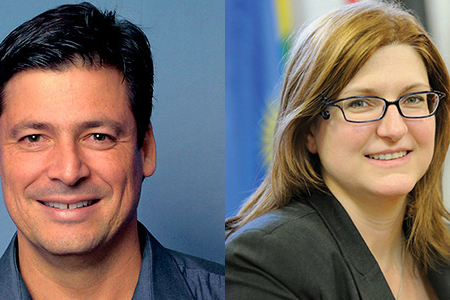In a March 31 webinar that drew over 5,000 registrants and nearly 3,000 live viewers, BC Law presenters Susan Simone Kang and Pedro Lenza took on the day’s most pressing concern: government responses to the coronavirus pandemic. The event was titled “Executive Power and the Constitution in the Time of Pandemic: Exploring Approaches from the US and Brazilian Experience.”
Zeroing in on the US and Brazil, Simone Kang, Boston College Law School’s Director of Graduate Legal Education, and Lenza, author of the top-selling book on constitutional law in Brazil entitled Direito Constitucional Esquematizado and visiting scholar at BC Law, argued that federalism built into the two countries’ constitutions has given governors and mayors a major say in the handling of the pandemic.
In the US, President Donald Trump appears to have accepted, however grudgingly, that local and state and local officials will determine when to lift stay-at-home orders and the closing of nonessential businesses (although his more recent comments have foreshadowed a battle with the governors as to who is the final decision-maker in opening up the US).
By contrast, Brazilian President Jair Bolsonaro, who has likened the virus to “a little cold” and sponsored an advertising campaign centered on the slogan “Brazil cannot stop,” has battled governors and mayors over shutdowns that in his view harm the nation more than the pandemic itself. As Lenza put it, “We have a big problem in Brazil because the federal government is saying that we can return to work, but the majority of the states, especially the state of São Paolo, the biggest state of Brazil, is expanding stay-at-home orders.”
Under the Brazilian system, the courts step in to referee disputes between the federal government and the states. In a series of cases that have pitted Bolsonaro against governors and mayors over pandemic-related issues, courts have ruled against the president and in favor of maintaining public health measures. Responding to a call from an opposition legislator, a supreme court justice has even directed Bolsonaro’s own attorney general to investigate the president for the crime of public endangerment.
Lenza, who is a member of the Brazilian Institute of Procedural Law and Brazilian Institute of Constitutional Law, outlined provisions of Brazilian constitutional and statute law that have helped the states and cities make their cases in the courts, including Articles 6 and 23 of the constitution, which give states and local governments the power to take measures for the protection of citizens’ health. Lenza also cited a federal law passed late in 2019 that gave governments at all levels the power to take robust public health measures in response to the pandemic.
For the largely non-US audience, Simone Kang—a BC Law adjunct faculty member who oversees the International Visiting Scholars Program, the LLM Master of Laws Program, and directs the BC Law Summer Institute: Foundations of US Law and Practice—explained how the 10th amendment to the US constitution reserves substantial powers to the states, including, in effect, the power to respond to emergencies with actions such as stay-at-home advisories and orders.
She also touched on Trump’s reluctance to use federal law, specifically, the Defense Production Act, to order manufacturers to supply equipment needed to fight the pandemic. On March 27, amid ongoing negotiations between the government and General Motors, Trump finally ordered the automaker to start manufacturing ventilators. The action, Simone Kang said, “just so [happened] to coincide with the passage of the CARES Act,” which responds to the pandemic by providing aid to states, small businesses, and the unemployed. Simone Kang speculated that “the president was likely looking for political support [for his order] by piggybacking on the federal legislation.” She also suggested that Trump singled out GM because, in 2019, the corporation defied his wishes by closing down an underused factory. “When you have a negotiation,” she said, “Personality is important, and so is leadership style.”
In a sign of the Law School’s international reach, the webinar, in Portuguese with English summaries, attracted participants from countries including Peru, Argentina, Nepal, Greece, Italy, and the US. The many Brazilian participants hailed from all over that country, including the cities of São Paolo, Fortaleza, Brasilia, Florianopolis, and Salvador, and the states of Minas Gerais and Rio Grande do Sul. It was the first in a planned series of webinars each Tuesday through April and May focused on an international audience, meant to highlight BC Law’s expertise across a number of legal subject areas as applied to the global #COVID-19 crisis.
Next in line: BC Law Professor and international labor law scholar Thomas Kohler joined Simone Kang and Lenza on Tuesday, Apirl 14, at 8 p.m. est, to discuss workers’ rights and differing responses from the US, Brazil and other countries. Future guests will include professors David Olson, Zygmunt Plater, and Kari Hong.
Will Business Ever Be The Same? How the Covid-19 Pandemic is Impacting the Economy from BCLaw Online on Vimeo.
Can Law Change Societies in Crisis? from BCLaw Online on Vimeo.


